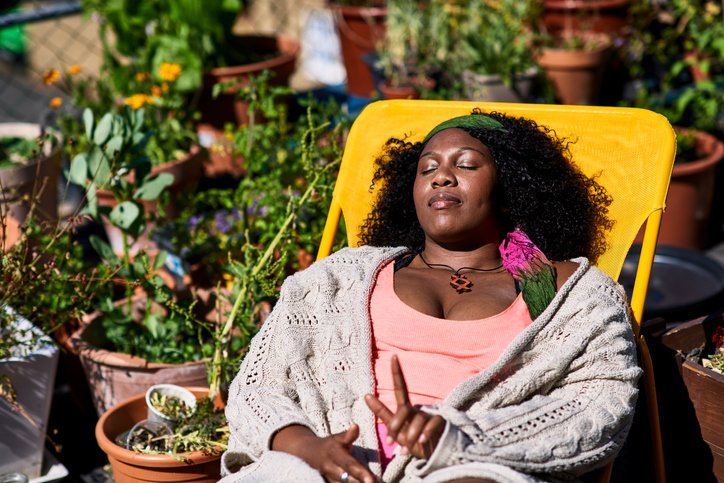
“If you are silent about your pain, they’ll kill you and say you enjoyed it.”
Zora Neale Hurston
I could no longer be silent about my pain. I had to take a sabbatical. My mental and physical health were on the line. Fifteen years of working high-pressure nonprofit jobs as a fundraiser and doing it while Black came crashing down on me toward the end of 2021. I could no longer stay in environments that were not conducive to my well-being. So, I resigned from my job and became a part of The Great Resignation. At the time, I did not have the words to describe my state. I wasn’t just tired, I was weary.
As accounted in Alisha Acquaye’s article in Allure, “It’s become normalized for Black women to feel tired,” says La’Tish M. Thomas, LCSW, a New York City-based clinical social worker and psychotherapist. Her virtual private practice, Therapy in Healing Spaces, caters to Black, Indigenous and women of color in their 20s to late 40s. “Culturally and generationally, we’ve seen our mothers and grandmothers take on so much,” Thomas adds. “Because of that, we’ve learned to hold onto everything. We feel the need to prove ourselves to society, which causes us to overwork to be ‘the best.’”
I initially thought I was failing. Giving up. I could not understand why my heart could not align with my actions. I loved what I did, right!? I could not understand why someone like me, who prided themselves on working at a high level, could only manage to do “my job” and could not muster the energy to go beyond that. In tandem, I felt compelled to start setting boundaries such as not answering emails after a certain time, not being available on the weekends, or being selective of when I went into the office. I was in fact protecting the little energy I had left.
To add to my despair, I knew I was not just at a career impasse but at an impasse in life. As my therapist would later share, it was an accumulation of the racial trauma I experienced working in the nonprofit sector that had worn me down. When those words spilled from her mouth, I had never felt more seen in my life. I was so used to being the living embodiment of the trope that as a Black woman I must strive for everything in life. According to a new study conducted by the JAMA Network with clinical neuropsychologist Negar Fani, “… Black women who have experienced more racism throughout their lives have stronger brain responses to threat, which may hurt their long-term health.”
I kept thinking that as a child of immigrants, I didn’t deserve to take a sabbatical. I had only known of rich people, those doing research, or those writing a book that did this. At the time, I could not yet view myself in this new narrative I was creating. I had to intentionally decolonize my mind and in the same breath, hold space for the magic that I would find on the other side of my decision, including:
Healing and Clarity: True healing began. I was able to step back and give myself permission to be vulnerable. For the first time I acknowledged the pain I was in. Prayer, therapy, and forgiveness became my lifeline. After 15 years of defining myself by my job titles, I created a narrative with God at the helm.
Safe Spaces: I doubled down on the environment I place myself in. I surrounded myself with family and friends that truly loved me and had my best interest at heart. No fake anything over here!
Laughter: I sought out anything that would make me laugh. In return, I experienced more belly-aching, tear-inducing, can’t-catch-my-breath laughter than I could ever imagine.
Discovery: I discovered joy. I uncovered a newfound love of executive coaching, and I’m currently in the process of establishing a new business venture based on that. I rediscovered my love for writing and had the honor of seeing my work published.
I took a sabbatical because I am entitled to rest and accessing joy at any time. I took a sabbatical because it was my middle finger to the white supremacist systems that I’ve operated in for years. I took a sabbatical because it gave me the space to answer the one question I never asked myself: “What do you want?” Everyone who knew that I was on this journey could not see past the financial aspect of my decision. Their thoughts were valid, but I wouldn’t have cared if it took every dime I had — it was better than staying where I was. I was stuck in a continuous cycle of pet to threat, misogynoir, microaggressions, racism, and any other –ism you can think of. It was time to get off that ride. Forever.
Before this new season in my life, I was not aware of organizations like the Durfee Foundation, R & R The Rest of Our Lives, and O2 Initiatives that provide grants for CEOs and executive directors to take some time off. And beyond The Octavia Fund, which provides funding specifically for Black women to take sabbaticals and retreats, I could not find much more for Black women specifically in the situation that I was in — women that are weary because of the burden of racism in the workplace and in life. I do know that there are tons of resources out there, but acknowledgment is the first step and giving yourself permission is the second, third, and fourth.
The stakes will always be higher for people of the Global Majority and specifically for Black women because we are conditioned to keep going even at the risk of our own health. Rest for Black women is an act of resistance. As Black women, we’re entitled to healing and restoration on our own terms. Saying “No!” to anyone and anything that is not concerned with your liberation is your right. Your voice is powerful. You should make no qualms about voicing your pain and finding ways to heal it.
Taking a yearlong sabbatical was a revolutionary and peaceful act because for the first time, I chose myself. And when the time comes, I hope you do the same — over and over again.


















